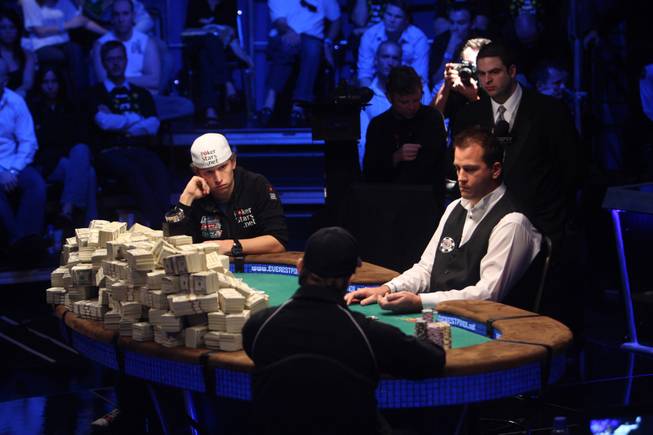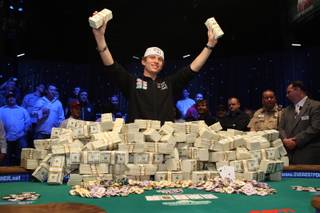
Peter Eastgate (facing camera) of Denmark plays against Ivan Demidov during the World Series of Poker at the Rio Tuesday, November 11, 2008. Eastgate, 22, defeated Demidov of Russia to win $9.15 million and become the youngest champion in World Series of Poker history.
Thursday, Nov. 13, 2008 | 2 a.m.
World Series of Poker
Alex, Jeff Haney and Andy Samuelson set the stage for 2008's final table.
Jerry Yang on WSOP
World Series of Poker 2007 champion Jerry Yang talks Monday about the WSOP finals this week at the Rio.
Sun Expanded Coverage
Beyond the Sun
Larger-than-life photos of past World Series of Poker champions adorned the walls of the Penn & Teller Theater at the Rio during the final table of the 2008 main event this week.
The first of the jumbo visages to greet fans as they entered the theater’s lobby happened to be that of Robert Varkonyi, the 2002 champion.
At first it seemed like an odd piece of product placement. Like Wally Pipp or George “Twinkletoes” Selkirk, Varkonyi is best known today as the answer to a trivia question.
In Varkonyi’s case, it’s this: Who won the World Series of Poker the year before Chris Moneymaker?
Upon further inspection Varkonyi’s de facto top billing made sense, even if it was a result of randomness. In some ways, Varkonyi represents the end of an old era for poker, as he was the last man to win the game’s world championship before it “got big,” as veteran poker pros put it, before it became a cultural phenomenon, before words like “boom” and “craze” were routinely attached to a word like “poker.”
And in a neat symmetry, you could make a good argument that the 2008 World Series of Poker final table marked the launch of a new era for poker, taking place as it did 117 days after the nine finalists were determined in the $10,000-entry no-limit Texas hold ’em tournament.
The delay was implemented in an effort to boost interest in, and TV viewership of, the final table — a tacit acknowledgment, perhaps, that big-time tournament poker was on the wane.
The new-look, post-boom, post-craze format drew mixed reviews from this year’s World Series finalists, along with a healthy dose of speculation about what will come next for poker.
“It was a positive thing. It was a good thing,” Dennis Phillips, who finished third in the World Series main event, said of the hiatus. “I had a hell of a lot of fun for four months. I’ve had a blast. I made good friends and I got to do a lot of work with charities. If I could repeat it next year, I would.”
Phillips, who won $4.5 million, planned to return to his day job as an account manager for a commercial trucking company in St. Louis.
“My per-hour pay was not too bad,” Phillips said of his World Series experience.
Fifth-place finisher Scott Montgomery, who acknowledged doing “a whole lot of nothing” to prepare for the final table during the break, would have preferred to have played straight through in July.
“I was not a fan” of the hiatus, Montgomery said. “It gives you a lot more time to build up nerves and it makes it a lot more stressful going into the final table.”
Peter Eastgate, the new world champion who clinched his victory Tuesday morning at the Rio, said it was essential to guard against allowing jitters to take over during the delay.
“A lot of the other guys were talking about how the break took them out of their zones,” Eastgate said. “But on the other hand, the same conditions apply to all of the guys.
“I believe that the most important thing to prepare for was the mental pressure, to prepare yourself for playing for so much money. You might find yourself in a position where you have to fold (pocket) jacks or queens or even aces if the board is really ugly. You have to be mentally prepared to find yourself in that position.”
Runner-up Ivan Demidov made the most of his break, finishing third in the World Series of Poker Europe main event in London last month.
Demidov liked the idea of taking a breather before the final table, but thought the 117-day hiatus might have been too long.
“At the final table in Europe, everyone was really exhausted,” Demidov said. “That final table really came down to whoever had the most stamina.
“A break was needed before the final table in Las Vegas because we had been playing for seven days straight. Everyone was so exhausted by then. I had no problem with a break, but maybe it could have been a little shorter.”
Finalists David “Chino” Rheem and Kelly Kim both said the revised format could aid poker in the long run even if it contains wrinkles to be ironed out in the short term.
“I’m all for it if it helps the game,” said Rheem, who finished seventh. “I don’t care if it helps me or not. If it helps future final tables get endorsements from Corporate America, then I’m all for it.
“But by the time they started airing (main event) episodes (on ESPN), it was kind of late. If anyone in Corporate America saw it, it was only two, three weeks before the final table started. It wasn’t really enough time for the players to get endorsements and things like that.”
Rheem, who said he thought about the tournament every day during the break — “but when I thought about it too hard, that’s when my mind started going crazy” — gave high marks to the well-appointed Penn & Teller Theater and the poker fans who filled it.
“You look around, you look at all the people who came to watch,” Rheem said. “It makes you feel like a professional athlete.”
Kim, who placed eighth, said the powerful lure of the World Series of Poker will keep the tournament’s cachet strong even if the specifics of its schedule are tweaked.
“It’s every poker player’s dream to win the world championship,” Kim said. “That’s what we as poker players do. We envision, and we dream about, winning the World Series of Poker main event.”
Ninth-place finisher Craig Marquis, who comes from Texas like so many of poker’s all-time greats, put it more succinctly.
“I really wanted to win it,” Marquis said. “I wanted my big picture up on the wall.”



Join the Discussion:
Check this out for a full explanation of our conversion to the LiveFyre commenting system and instructions on how to sign up for an account.
Full comments policy